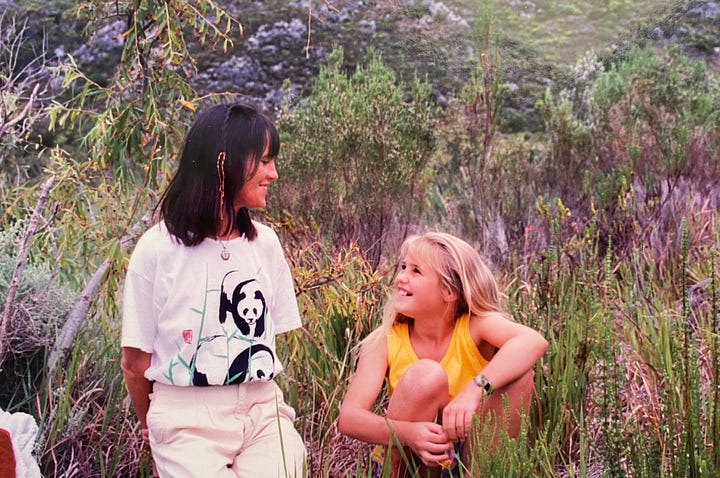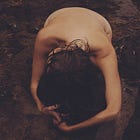Behind the scenes: eleven - a poem
An exploration into the poem, eleven, on page 24 of my book, breaking open.
Did you miss my first installment for the ‘behind the scenes’ series:
If you’re like me and enjoy being read to, here is my audio recording of this piece:
11, a dark winter’s night wrapped in a cloak of tangled emotions tripping me up shrouds of shoulds society’s rules who am I?
While most of my classmates were celebrating their eleventh birthdays with a party in the backyard, balloons attached to chairs, chasing each other around the lounge, a decorated cake on the table, and kids singing happy birthday, my eleventh birthday was very different.
On the 2nd of February every year since my first birthday (until we moved before my 13th), my parents took me up to the dam on the farm, at the base of the mountains, and we hiked through the forest to a spring that fed into it (obviously I didn’t hike it until I was about three or maybe four). It poured over moss covered limestone rocks, in amongst the forest of ancient milkwood trees, creating a path to the larger body of water it joined.
My eleventh birthday was here, at the spring, with eleven white candles pressed into the mossy ledge.
Every year we added one candle (or two depending on how many had slipped away during the year). It was me, my parents and the three dogs usually. Being February, and the hottest time of year often in the Southern Hemisphere, we walked back after the candle ceremony, stripped off and all waded into the dam with its white sandy bottom.
(I was born and brought up in South Africa until I was nearly 17)


We all swam naked. That was normal. And normal for my parents’ friends when they came to visit. I had already figured out that this wasn’t normal for most people, and this was reinforced at my eleventh birthday. A friend from school joined me and my parents for the day, and when she told her parents that we all swam naked, she wasn’t allowed to visit again.
I had met her when I was 10, the year I first attended a real school in Grade 5 (Standard 3 in South Africa).
Because we lived remotely on the farm, the closest school (15 minutes away) was a small building for the coloured children*. Even though they were all my friends on the farm, when it came to school time, we were divided by the rule of apartheid in South Africa, which only ended later in 1994 (the year I turned eleven).
The next closest school (25 minutes away) was an Afrikaans school (whites only), and even though I had grown up speaking Afrikaans fluently (as my second language), my parents hoped I’d take up their offer of homeschooling. Although the apartheid regime was coming to an end, the culture of this school was still very entrenched in the concept of division.
So, my mum, and of course farm life, were my teachers for the first four years of ‘schooling’. Over time I began to long to be like the other kids and go to school. I wanted to wear the blue uniform, a pinafore dress over a white shirt, with black shoes. Of course, I had no idea what it would really mean, except that I’d be “normal”.
And so it was that just after I’d turned ten, and we’d bought the correct dresses, shirts and shoes for the school, off I went to Gaansbaai Primary, which had a bus ten minutes from our farm gate. Five days a week, my mum or dad drove drive me and the farm kids to the junction, sitting on the back of the bakkie (a ute). They’d walk down the road to their school, and I’d climb into the white minivan to drive another fifteen minutes to my school.
I was the only English-speaking pupil out of the hundreds of students.
I adapted to most of the unspoken rules pretty quickly. Be nice, people please, don’t speak up, and you’ll be fine. You’ll mostly fit in and fly beneath the radar of the bullies. In other rules, more spoken, get good grades, don’t muck up, and you won’t be caned. Not that girls were caned, but the young boys were. I remember the first time one of the ten year old boys got taken out of class for getting his sums wrong. A short time later he returned, his face red, and tears pouring down his cheeks. The strange thing was the teacher picked him up on his shoulders and made a joke about being brave and that he’d get better at his maths.
It didn’t make sense to me. But no-one said anything.
I didn’t know it at the time, but I’m pretty sure this event (and the following canings the boys were pulled out for) went deep into my subconscious. Even though I mostly excelled in my grades, I developed an irrational fear of failing (even once I got to university).
The main area my mum focussed on with me in our homeschool was Maths, English and creativity (art and writing), so luckily I was anything but behind when I arrived. If the teacher was going over something I already knew (especially in the English class), my mind drifted back to the farm… What were the chickens up to right now? Which flowers were out along the edge of the sandy farm track on the way to the dam? What were the farm workers picking and dyeing with my dad?
Between busses and homework, I didn’t have much time once I got home during the week.
One rule I did break was to hang out and play with the “kleurlings” on the farm, a derogatory Afrikaans term used during apartheid for the Cape Coloureds*. One day when I was carrying a bench seat through the door with a friend, I let my end knock into the frame and my physical education teacher, also the bus driver who saw me every morning with my non-white friends, slapped me over the head and called me a Kaffir-boetie. This is an Afrikaans term often used to describe a white person who fraternised with or sympathized with the cause of the black community (thanks for this description Wikipedia).
By the end of that first year of ‘real’ school it was clear that an English-speaking school would be more supportive for me, and I ended up at Hermanus Primary.
My mum made the sacrifice to be away from the farm Monday to Friday to be at a holiday rental with me near school (daily commuting to and from the farm wasn’t an option). The house was close to the beach, which was a saving grace for her (I haven’t asked her too much about this time, possibly because I carry some guilt for being the one to drag her away from her happy place on the farm).
So eleven may have looked quite idyllic from the outside: a warm dry home that my mum stayed with me in during the week (my dad remaining on the farm), back to the farm on the weekend, good grades, friends, a healthy body…
But underneath I felt so different to my peers. One obvious difference that friends from primary school noticed, was no TV. This didn’t bother me. My friends now sometimes lovingly tease me when they talk about a kids show from the 80s or 90s and I look back at them, eyebrows slightly raised to remind them we had no TV.
However, this was a surface difference.
In my ideal world, one where I didn’t have to chose between being a normal school kid and living life on the farm, I wanted to be in nature, creating tree houses with my playmates who lived on the farm, swimming, climbing trees, catching rides on the tractor and hanging out with the animals.
Although at the time it manifested as frustration and grumpiness when I got home from school and was tired from the day. In hindsight what I see is a time when parts of me, there to protect me, were being born and growing stronger: for a start, my people pleaser, perfectionist and the invincible superwoman (who can do it all herself)**.
Who was I? What did I have to hide to be more like my classmates? If I just people pleased and played the nice girl people seemed to like me. If I kept the perfectionist whip out on my studies, I was safe. In control.
And so began a deeper ingraining of very successful mechanisms to help me fit in in the wider world and excel academically at school.
It is this deeper exploration into that time, which led me to play with the words I’ve used in the poem eleven. It is part of a sequence of 3 written from the prompt by Tanya Markul in 2021: point out three decades of your life where you changed, where ‘life happened’, referred to already in my first Behind the scenes post.

Even though life had already happened in many big and small ways by eleven, the start of my journey with real school was the perfect breeding ground for heightening that deep human need to belong. And along with this quest for belonging came all my internal stories (similar I suppose in essence for many of us, and yet quite different), which years later, on my healing journey, I began to unpack and explore.
So now I’m curious, if you were to think back on eleven or the time you began school, do you feel a change within you? Do you look back and notice a milestone around this time where in Tanya Markul’s words life happened?
In hindsight, what is one of your first memories where you were dancing with that deep desire to belong?
I would absolutely love to hear a word, a few sentences, a poem or a story of what this piece stirs in you.
With love,
Kali
* a term used in South Africa for a group of mixed-race people of a certain heritage and cultural identity (descended from the Koisan and Dutch) in the Cape.
** names inspired by my training with Christine Arylo at the Path of Self Love.







You've opened the door to a so-important period of your life, and you've written it so beautifully.